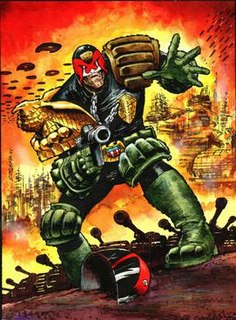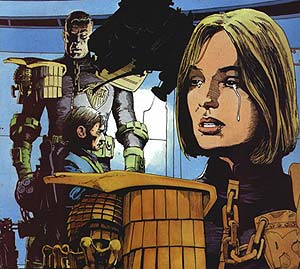Plot
"America" begins as a love story, told from the point of view of Bennett Beeny, whose secret love for his close childhood friend America Jara is sadly unrequited. As they grow up together, America becomes disillusioned with the Judges' dictatorial rule over Mega-City One, and becomes a campaigner for the restoration of democracy. Beeny, on the other hand, is too afraid of the Judges to stand up to them, and craves a quiet life; however his efforts to dissuade America from pursuing her dangerous activities fall on deaf ears. As they are about to graduate from high school, Beeny confesses his deep love for America, who (as he predicted) rejects him, saying that her love for him is only platonic. She leaves him to go to university with her boyfriend Doody, while Beeny becomes a successful singer of comedic songs and makes his fortune. Over time their correspondence dwindles to nothing.
Some years later Beeny, still pining for his lost love, has resorted to seeking the services of prostitutes, having failed to establish a long-term relationship with anyone else. By complete chance, one night the prostitute he approaches transpires to be America, who in fact is in disguise, as she is part of a terrorist cell which has laid an ambush for a patrol of judges. Before either of them can react to their unexpected reacquaintance, two judges arrive, and America and her terrorist comrades shoot them both dead. As they are about to flee from the scene of the crime, one of the terrorists, Kurd, sees Beeny and, ignoring America's protests, shoots Beeny in the throat, so as not to leave any witnesses.
Miraculously however, Beeny survives and is rushed to hospital, where he is interrogated by Judge Dredd (Beeny typing his answers). Beeny covers for America, and lies to conceal her involvement. Afterwards Beeny receives an electronic throat implant which enables him to speak again, but his illustrious career as a singer is over.
On his discharge from hospital, Beeny returns home, where he is soon visited by America, ostensibly to apologise for what happened, and to thank him for not informing on her. She also reveals the reason why she has turned from peaceful protest to violent methods. In 2109 she took part in the Democratic March, a peaceful demonstration which was subverted by undercover judges who provoked violence, in order to give the riot squads a pretext to attack the demonstrators. During the ensuing violence, her boyfriend Doody was killed and America – pregnant by Doody at the time – was seriously injured. While serving her sentence in custody, the judges scheduled her child for mandatory abortion due to genetic mutation. The experience left her traumatised. On her eventual release, she was consumed with bitterness and hatred for the judges, and she joined the violent anti-judge organisation Total War. After telling Beeny her tragic story, America unexpectedly makes love to him.
The next morning America asks Beeny for a large donation of money to fund Total War's next operation. Initially Beeny is reluctant, since he does not approve of murder, and he also suspects America of cynically using sex and his love for her to manipulate him. However he eventually relents and hands over the money, since she assures him that nobody will be hurt, and he refuses to believe that she would stoop so low as to use him, preferring to believe that she is sincere.
As America promised, Total War's plan is not to take more lives but to blow up the Statue of Liberty, in a symbolic gesture to emphasize that there is no longer any liberty anymore under the Judges' rule. However, Beeny secretly informs Judge Dredd of their plan, since he realises that his conscience will not permit him to be an accessory to another terrorist attack. He obtains Dredd's assurance that America will not be harmed.
On the night of the attack, Dredd's team of judges lie in wait in various hiding places around the Statue. Beeny is not authorised to be present, but is waiting in his car not far away. When the terrorists' vehicles arrive, the judges electronically disable their vehicles and then reveal themselves in force. Surrounded, the terrorists immediately recognise that they have no chance of escape, and Kurd attempts to surrender, discarding his weapon and exclaiming "no contest!" Unmoved, Dredd gives the order to fire at will. Kurd is cut to pieces by automatic fire from at least two dozen weapons.
Within seconds all of the terrorists lie dead, except America. However, one judge either ignores or fails to hear Dredd's order to cease fire, and shoots America in the head, just as Beeny arrives at the scene. Beeny desperately calls for medical assistance, but she is beyond help. Beeny rails against the unrepentant Dredd for the massacre, until he realises that America's blood is, literally and metaphorically, on his own hands.
America is brain-dead, but her body is still fully functional, and Beeny arranges for his own brain to be transplanted into her body, as he is unable to let go of her memory, or of his own guilt. Living in America's body ensures that Beeny is constantly reminded of the woman he loved, and of his role in her demise. He returns to his singing career, but now instead of singing funny songs, all of his songs are sad.
Sequels
In 1996 new editor John Tomlinson commissioned a sequel, "America II: Fading of the Light". [3] It is revealed in this story that Beeny arranged to become pregnant from sperm he stored before transplanting his brain, and gave birth to his and America's daughter, named America Beeny. Bennett Beeny survives a second encounter with Total War terrorists, but dies shortly afterwards of medical complications resulting from the transplant. Ironically he arranges for five-year-old America to be inducted into the Academy of Law in order to become a judge, reasoning that the Academy is the only place where she will be safe from Total War, and that she might change the system from within.
Ten years later a third story, "Cadet", followed Cadet Beeny's progress through training, when Dredd supervised her during an assessed investigation. She did not hold Dredd personally responsible for her genetic mother's death. She passed the assessment, and has since appeared as a supporting character in Judge Dredd stories not directly related to Total War.








